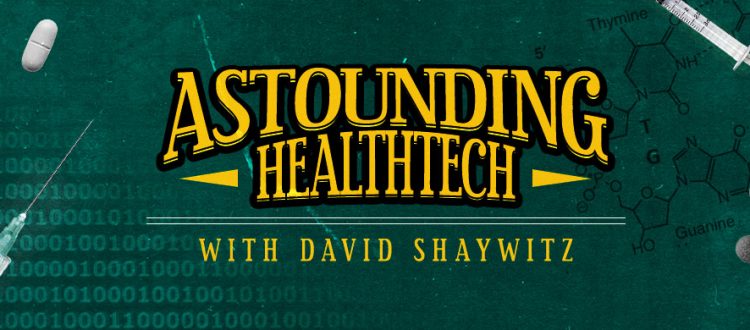Adtech Data For Health: Time To Get Past The ‘Ick’ Factor

David Shaywitz
If you were responsible for the health of a large population, and could access just one of the following types of data, what would you choose (assuming all were acquired legally and responsibly)?
(a) Genetics and other –omics data;
(b) EHR data;
(c) Consumer/adtech data.
For at least the last 20 years, we’ve been obsessively focused on the first two categories, as proponents of precision medicine were enthralled with the possibilities of what we could learn from genomics and other types of -omics data. Advocates for a learning healthcare system, meanwhile, tended to emphasize the value of medical record data. These efforts have yielded important progress.
At the same time, if we’re being honest, we must acknowledge that these approaches haven’t (yet) delivered anything close to the envisioned healthcare transformation originally promised. Perhaps, we just need to be more patient.
While some academic groups have begun looking at consumer/adtech data, this information has remained largely off-limits for serious healthcare companies and researchers — mostly because it’s just too fraught, enmeshed as it is with ethical and legal landmines. The very existence of the copious amounts of data on consumer buying patterns and expressed affinities is viewed by some as intrinsically problematic. Many worry about the ecosystem in which these data were generated, concerned about the increasing pervasiveness of what sometimes called “surveillance capitalism.”
According to some critics, these data shouldn’t even exist. Given the reality of their enduring presence, many believe we should do all we can to minimize their impact.
Similarly, I suspect some medical researchers viscerally view adtech data the same way they (and I) view the results of historically unethical experiments, like (to pick a deliberately extreme example, and risk invoking Godwin’s Law) Nazi doctor Josef Mengele’s notorious twin studies. The repugnant method in which Mengele’s data were obtained are generally felt to outweigh any potential utility; the results are not typically considered part of the scientific canon.
While Mengele analogy may be over the top, the discomfort towards this information is real, and consequently, most everyone in healthcare steers clear – well clear – of adtech data. Medical systems, to the extent they are even aware such data exist, are unlikely to go anywhere near them; it would risk reducing patient trust, with no apparent upside. (I’m sure the marketing department of medical systems are well-aware of these data, but have no interest in connecting this information with traditional health data.)
Tech companies like Google and Amazon are keenly aware of consumer and adtech data; their business models and staggering valuations are built on these data. Yet, most large tech companies seem to have decided that they want to become trusted partners to healthcare. The business opportunity they see in this space doesn’t involve their traditional model of harvesting consumer data; rather, they hope to sell cloud computing and related services (like AI) to hospitals, drugmakers, health insurers and others.
In their interactions with healthcare systems, Google, Amazon, and Microsoft each seem to go out of the way to emphasize the robust firewall between patient data and consumer data. At a recent healthcare conference, senior physician-executives at Microsoft and Google, for example, repeatedly emphasized the importance of trust and equity in all discussions of technology. These tech giants want healthcare data from clinical care and pharmaceutical research to be managed and analyzed on their respective cloud services.
The tech companies evince little interest in “crossing the streams,” and somehow connecting adtech data and healthcare data. The goal is to be trusted stewards of the health industry’s sensitive data, and to help healthcare customers use analytical tools to extract greater value from this information.
Apple, for its part, has never been particularly interested in monetizing individual data, but rather seems focused on providing a secure data ecosystem, so it can sell the devices that collect (Apple Watch) and integrate (iPhone) this information.
Facebook, meanwhile, was exploring the possibility of integrating user and health data back in 2018. This work was happening largely out of public view for more than a year. As described by Sidney Fussell in The Atlantic in January 2020, Facebook had sent cardiologist Freddy Abnousi (current head of health technology at Facebook) on a mission:
“He was to get the Stanford University School of Medicine and the American College of Cardiology on board with a new project that would combine Facebook user information with hospital-patient data in order to influence patient outcomes. Facebook hoped it could leverage the cache of data users already give it – about their education, relationships, habits, spoken languages, employment status, and more, all of which have an enormous impact on health outcomes – to create a sort of subclinical health-care system, warning providers if, for example, a user recovering from surgery had a small support group.
Then came the Cambridge Analytica debacle, and with it a cascade of highly public inquires and privacy revelations that resulted in the cessation [of these efforts].”
The Cambridge Analytica scandal, in which Facebook user data was harvested without consent and ultimately used to inform political campaigns brought new scrutiny on many aspects of the social network’s business. In response, Fussell reports, Facebook opted to roll out a dramatically scaled-down version, “Facebook Preventive Health.” The capability is offered as an (opt-in) feature in the Facebook mobile app, and uses only two user data points: age and gender.
Just a few months after The Atlantic report, Facebook still seems to be pursuing an ambitious health vision. Facebook’s Abnousi is currently hiring a Head of Health Tech Research, seeking “a world leader in outcomes research to develop and execute a digital health tech research agenda that is aimed at improving morbidity, mortality, cost, and inequity in health outcomes” (you can apply here). This suggests that although Facebook told The Atlantic that the Preventive Health effort is unrelated to the original data sharing proposal, the underlying goal outlined in talks with Stanford and the American College of Cardiology has endured.
Without question, there’s a creepy, icky aspect to adtech data, information that speaks to our habits and predilections, and are collected every time we Like something on Facebook, purchase something on Amazon, or search for something on Google.
Responsible health researchers typically seek to understand patients based on parameters like genetic sequence or physician notes or claim records – each of which could be exceptionally useful. But meanwhile, reams of data describing our actual, real-world behaviors are now the exclusive provenance of advertisers seeking to hawk soda and politicians. Health scientists and hospital administrators, for the most part, seem to have a knee-jerk reaction against touching these data; concerned about the risks and anxious about the many uncertainties. But the inconvenient truth remains: our behavior and choices play an outsized role in determining our health – and adtech data may offer the most relevant window into this critical parameter.
From the perspective of a startup, the ickiness of the data, and its existence in a grey area, may represent an opportunity, since established healthcare companies and tech giants are likely to give these data wide berth, creating an opportunity for a startup in the model of Uber or PayPal willing to embrace and intelligently navigate the risk, as VC Josh Kopelman has described.
A startup that could leverage adtech data and generate relevant health insights for traditional stakeholders could be an intriguing proposition. Think of all the research that seeks to elucidate the genetic basis for extreme phenotypes, including exceptional responders; imagine if there was a way to identify characteristics of patients most likely to maintain weight loss, or patients most likely to respond to treatment A vs treatment B.
Intriguing as these research questions are, figuring out the right business model for a startup in this space remains a critically important challenge.
As a leading data guru told me:
“The main issue is what do you do with this information … that’s what I don’t think anyone has figured out. Let’s say you can figure out that [some factor] is correlated with a particular health outcomes, etc. — how does that actually change the course of care, or what pharma companies/payers/providers do?”
This feels to me like a solvable problem – and a worthy challenge. The risks can be responsibly managed. To the extent that we remain awash in ultra-granular, legally-obtained behavioral data, it seems a shame not to gainfully leverage this information for the improvement of human health.





